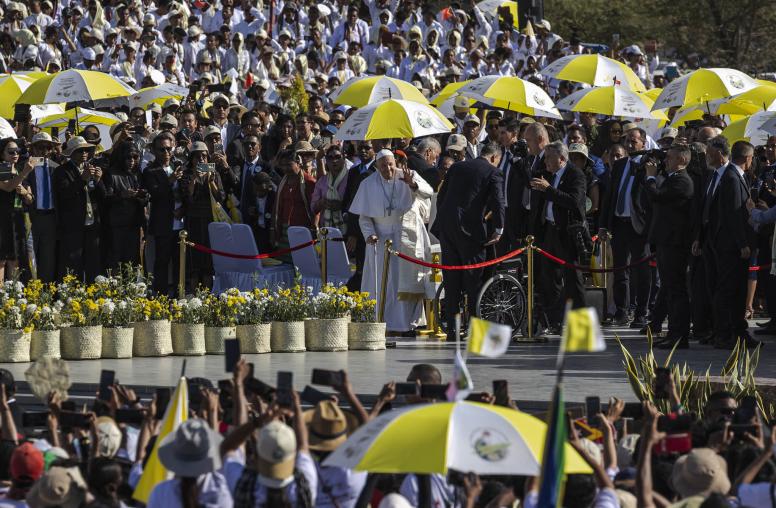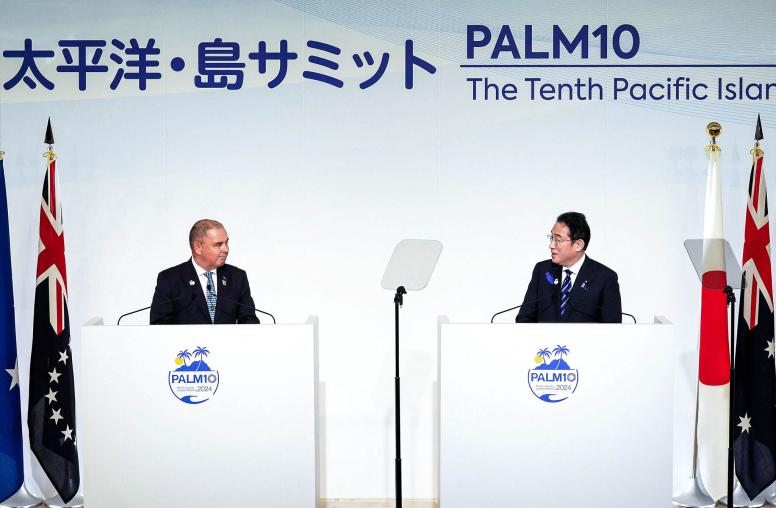In the Pacific, Corruption and Poor Policing Open a Door to China
Peace in island nations will require reforms beyond the West’s technical policing assistance.
After the Pacific’s largest island nation, Papua New Guinea, recently suffered deadly rioting that included police, an official last week announced a Chinese offer to help strengthen its police force. That sequence exemplifies a rising challenge for democracy and stability in the Pacific: Many island nations suffer corruption and deficient policing that undermines the rule of law. This gap in responsive governance lets China seek influence through technical assistance drawn from its authoritarian model of policing. In response, democracies must reshape narrow, outdated approaches to security assistance.

Papua New Guinea’s (PNG’s) central place in competitions for influence by larger powers is visible this week in Prime Minister James Marape’s visit to Australia, including a rare address by a foreign leader to its parliament. Marape faces domestic criticisms and prospects of a parliamentary no-confidence vote in his premiership.
Corruption: A Root Problem
For decades, PNG and many other Pacific nations have invested minimally in their rule-of-law institutions, in part because at least some powerful elites would seem to be profiting from corruption that could not survive stronger mechanisms of government and financial accountability. A 2021 Transparency International survey found 61% of people across 10 Pacific Island countries and territories describing government corruption as a big problem — the view of a staggering 96% of respondents in PNG and 97% in Solomon Islands. The monitoring group’s latest global report found “another year of little to no meaningful progress towards curbing corruption” in the Asia-Pacific region.
Government and independent assessments find PNG’s policing ineffectual, not least for a lack of adequate resources — even vehicles, fuel or stationery. This ineffectiveness burst violently into into view last month. When government employees received only partial paychecks on January 10, parts of the capital city’s police faded away. The result was looting, mayhem and more than 20 dead.
Then last week PNG Foreign Minister Justin Tkachenko said his government was considering a Chinese offer of training and equipment for its police forces, eight weeks after PNG had agreed to a $150 million security assistance package from Australia. U.S. Deputy Secretary of State Richard Verma quickly warned PNG against accepting China’s offer.
In Western policy and political spheres, concerns around policing are astringently strategic — the prospect of China exploiting Pacific Islands’ weak rule of law to build influence in competition with the United States, Australia and other powers. Yet any effective answer to the problem must target not just the China part of the equation but more importantly the Pacific part, too. That means shifting our priority to repairing the shortcomings of governance — including policing — that leave many Pacific Island states unresponsive to their people’s needs. The usual remedies of foreign aid such as training, equipment and advisers — aren’t up to snuff. Last month’s PNG riots dramatized the utter inadequacy of this decades-old model of support.
The riots turned a spotlight on the police’s structural problems. Only 6,000 officers serve a population estimated at 9 million or more. A 2020 government study found it would take over $1 billion to build policing to a functional standard, and the force is hobbled by the same opaque lack of accountability that Freedom House and other independent monitors find across government institutions. The police have a woeful problem with discipline. A former Papua New Guinea police minister described his force as beset by a “rampant culture of police ill-discipline and brutality”; its own commissioner observed his ranks include “criminals in uniform.”
Official corruption is an obstacle to — and must be a target of — police and rule of law reforms that PNG needs for long-term stability and peace. Accordingly, countering corruption must be a focus of any effective security assistance. Independent monitors such as Global Witness have estimated in past years that corruption siphoned off as much as 7% of the country’s gross national product. PNG governments have proclaimed, but inconsistently and anemically funded, anti-corruption initiatives. Last year the United States noted “endemic corruption and complicity among officials” and a “lack of significant [enforcement] efforts” around human trafficking, including alleged “government complicity in a sex trafficking syndicate.”
The Organized Crime and Corruption Reporting Project and other independent media also publish evidence of official corruption. The stories often involve a brash money-making scheme fronted by a roguish personality from overseas with connections to a senior leader who thunderingly denies any wrongdoing, followed by promised investigations that produce no results — an unsurprising outcome where poor government accountability saps the incentive and the policing wherewithal to pursue it.
Papua New Guinea reflects conditions in other Pacific Island nations. The public perceptions of corruption, as documented by Transparency International, and investigations into Fiji’s role as a base for drug smuggling, are parts of a larger picture of Pacific Island nations as too-frequent venues for transnational organized crime. This week Fiji’s former prime minister, attorney general and health minister are due in court on charges relating to corruption. Meanwhile, police officers in Tonga and other nations are so badly paid that some quit their jobs to go pick fruit in Australia or New Zealand.
An Open Door for China
Where Pacific Island nations suffer serious shortcomings in governance — as in assuring public order or state finance — China is ready to use them as open doors to build influence.
Over 10 years, China has ramped up engagement with Pacific police forces, offering equipment and training, a regional role traditionally played by Australia. Fiji, the first Pacific Island country to sign a policing accord with China, in 2011, cancelled its arrangements last year. China’s biggest current policing presence is in Solomon Islands, with which it signed a security pact in 2022. One local journalist voiced a concern from the competition between Australia and China in providing equipment as part of their assistance programs: a police force endowed with military-style weapons such as those that were turned against the government during a 2000 civil conflict. In 2023, China sent police experts and equipment to Vanuatu.
China’s role has included extra-territorial policing of its citizens. This has resulted arrests and deportations, without legal proceedings, of Chinese nationals in Fiji and Vanuatu . The constituency with most to fear about Chinese expansion into policing in the Pacific may be Chinese residents of those countries.
A New Approach
The ingredients of Western help for Pacific police forces seem little changed over the 40-plus years in which Papua New Guinea’s police have been so extensively (and expensively) assisted. While technical assistance is still needed, democracies must dramatically broaden their focus to include the root causes of ineffective governance and the weak rule of law. One signal opportunity is for the United States to build this broader focus in Papua New Guinea as one of nine countries in which it is rolling out its 10-year Strategy to Prevent Conflict and Promote Stability. Better support for PNG’s police, rule of law and domestic peace and stability can include these steps:
- Partner more assertively with PNG officials, constituencies, and civil society groups ready to prioritize the national and regional fight against corruption. This should include, and stretch beyond, helping PNG’s police strengthen the specialized capacities to tackle financial crimes. Some specific steps here will emerge from a review, of PNG’s performance on international standards against money laundering and terrorism finance, now underway by the multinational Financial Action Task Force.
- Prioritize the security needs of communities and people rather than elite interests. That’s especially apposite in a country, and a region, where people go to clan, church or community leaders for solutions to their problems. One response can be “policing coalitions” among uniformed police and such local institutions and leaders. An obvious human security focus should be gender-based violence. Human Rights Watch research suggests this trauma is inflicted on roughly a third of PNG’s women each year, and other research notes that women often are targeted over accusations of sorcery. Some local initiatives to address everyday instability might, to Western eyes, look unusual. Yet research shows they are the most effective.
- Understand better the wider ecosystem surrounding the security sector. A USIP working group of experts and researchers last year identified the “elite capture” of a state’s security institutions by those in power as a major source of the “effectiveness gap” in security sector assistance. The group identified ways to “recognize elite capture, prepare for it and counter it over the long term.” While the Pacific Islands did not figure in the group’s analysis, policies can use the analytical tools the group developed to understand the security sectors of this increasingly important region better.



